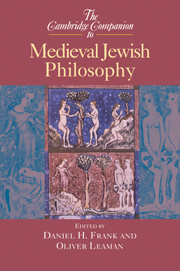Book contents
- Frontmatter
- PART I BACKGROUND AND CONTEXT
- 1 Introduction to the study of medieval Jewish philosophy
- 2 The biblical and rabbinic background to medieval Jewish philosophy
- 3 The Islamic context of medieval Jewish philosophy
- PART II IDEAS, WORKS, AND WRITERS
- PART III THE LATER YEARS
- Guide to further reading in English
- Index
2 - The biblical and rabbinic background to medieval Jewish philosophy
from PART I - BACKGROUND AND CONTEXT
Published online by Cambridge University Press: 28 May 2006
- Frontmatter
- PART I BACKGROUND AND CONTEXT
- 1 Introduction to the study of medieval Jewish philosophy
- 2 The biblical and rabbinic background to medieval Jewish philosophy
- 3 The Islamic context of medieval Jewish philosophy
- PART II IDEAS, WORKS, AND WRITERS
- PART III THE LATER YEARS
- Guide to further reading in English
- Index
Summary
Medieval Jewish philosophy is in large measure an interpretation in philosophical terms of beliefs, concepts, and texts bequeathed to medieval Jews by the Bible and by rabbinic literature. Thus, much of the agenda of medieval Jewish philosophy is set by ideas featured in the Bible, Talmud, and midrash: God, creation, prophecy, providence, miracles, commandments, and more. For this reason, although there is a need here to present the biblical and rabbinic background to medieval Jewish philosophy, the discussion will largely be an exposition of one aspect of medieval Jewish philosophy itself: namely, its ambition to provide an exegesis of biblical and rabbinic texts, along with explications of their concepts, that would demonstrate the value of philosophy in earlier Judaism and would unearth rigorous philosophical propositions contained in the ancient works.
Examples abound. Saadya Gaon (882–942), head of the academy in Babylonia and the father of medieval Jewish philosophy, and Levi ben Gershom (Gersonides) (1288–1344), an eminent philosopher, logician, and scientist, authored biblical commentaries – Gersonides’ cover a very substantial part of the Bible – that are controlled by a view of the book as shot through with philosophical truth and as standing in agreement with the conclusions of human reason. While the less illustrious rationalist Joseph ibn Kaspi (1279–1340) authored a commentary on the Bible that is controlled not by the assumption of an underlying philosophical truth, but instead by a historicist view, he is an exception among medieval rationalists.
- Type
- Chapter
- Information
- The Cambridge Companion to Medieval Jewish Philosophy , pp. 16 - 37Publisher: Cambridge University PressPrint publication year: 2003
- 1
- Cited by

